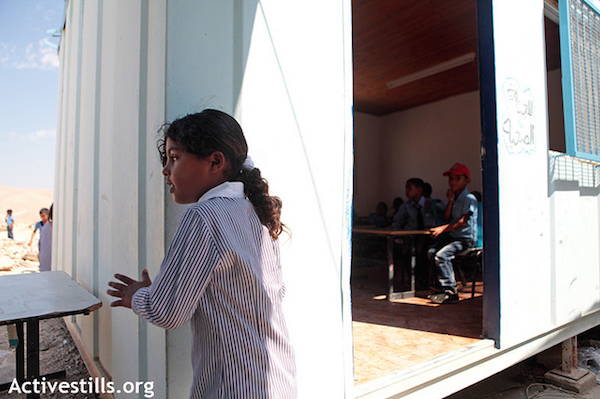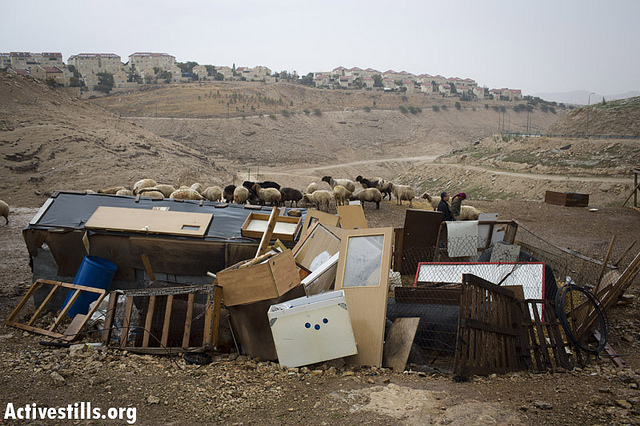An Israeli settler NGO has accused the EU of illegal building in the West Bank. But the facts — and its understanding of international law — just don’t add up.
By Michel Waelbroeck and Willem Aldershoff

Reports started circulating before Israel’s elections that Prime Minister Netanyahu had ordered the destruction of mobile structures distributed by the EU in Area C of the West Bank. This harks back to a report in November 2014 by the Israeli NGO Regavim, which draws a shocking parallel between the EU’s humanitarian assistance to Palestinians in Area C and Israel’s building of settlements there. Assuming that Israel’s settlements are legal under international law, Regavim accuses the EU of assisting the Palestinians in an illegal plan to take control of large parts of the West Bank.
This simply puts matters on their head. There is no doubt that Israel’s settlement policy violates international law whereas assistance to Palestinians building in their own country is in full conformity with the EU’s responsibilities under humanitarian law.
Regavim claims that Israel does not “occupy” the West Bank, since that area was not under the sovereignty of any state when it was taken over by Israel. That argument is specious: it was firmly rejected by the International Court of Justice in 2004 in the case concerning the construction of the Wall, and it is not accepted by any other member of the international community. Contrary to Regavim’s argument, Israel does not enjoy sovereign rights over any part of the West Bank, whether in East Jerusalem or in Area C ; Israel must respect the Fourth Geneva Convention, to which it is a party, and which prohibits an occupying power from transferring its population into occupied territory.
In 1947, the UN General Assembly recommended splitting mandatory Palestine into two independent states – an Arab State (Palestine) and a Jewish State (Israel). Whereas Israel unilaterally proclaimed independence at the time, Palestine could not do so, being occupied by Jordan and, since 1967, by Israel. This does not mean that the West Bank and East Jerusalem are subject to Israeli sovereignty. Palestinians in the West Bank live in their own country.
The Regavim report acknowledges that the EU saves Israel a great deal of resources through its humanitarian activities, which, “in effect, carry out Israel’s obligations towards the Palestinians.” However, it complains that, when financing Palestinian construction in Area C of the West Bank, the EU violates the Oslo II agreement, which, “clearly specified that Area C would be under the full responsibility of the State of Israel.” The EU thereby “cynically exploits … Israel’s unwillingness to clash diplomatically with the European States” by “trampling on the law.”
The origin of this ire is to be found in the particular situation at which the Regavim report is directed. It is well known that Israel intends to isolate East Jerusalem from the remainder of the West Bank by building settlements in an area north-east of Jerusalem referred to as E-1. Doing so would make a contiguous and viable Palestinian State impossible.

Regavim claims that the EU-financed structures were built without the required permits. The zoning rules imposed by the Israeli authorities, however, allow construction by Palestinians in less than 1 percent of Area C; the remainder is reserved for Israeli settlements, closed military zones and nature reserves. Therefore, it is practically impossible for Palestinians to obtain building permits, as the World Bank attests in its 2013 report on the Palestinian economy. This constitutes a violation of Israel’s obligation, as an occupying power, to exercise its powers for the benefit of the Palestinian population. Moreover introducing these restrictions violates Israel’s obligation to preserve, unless absolutely prevented, the laws in force before the occupation.
Regavim also claims that the Oslo II Agreement gave Israel “full control” over Area C and accuses the EU and the Palestinian Authority of preventing Israel from “exercising its sovereignty” in the area. This is a shocking distortion of the facts: Oslo provided that powers and responsibilities relating to planning and zoning would, subject to certain issues, be resolved in permanent status negotiations, and come under Palestinian jurisdiction within 18 months from the inauguration of the Palestinian Council (7 March 1996). Israel’s role was clearly designed to be temporary.
The Oslo Agreement was never fully implemented. The result, however, was not to place Palestine in a situation of everlasting dependency on Israel’s goodwill in planning matters. The Fourth Geneva Convention provides that the occupied population may not be deprived of the benefits provided for it under its provisions, even as the result of an agreement concluded between the authorities of the occupied territory (Palestine) and the occupying power (Israel). Therefore, Israel may not take advantage of the breakdown of the Oslo negotiations to deprive Palestinians of rights they had under pre-existing legislation.
The Regavim report completely distorts two basic concepts by accusing the EU of acting illegally through its provision of humanitarian assistance to residents of Area C. It is Israel that acts in breach of international law, both by building settlements for its own citizens, and by acting as if it were entitled to exercise sovereignty in the West Bank. The EU is fully justified in helping Palestinians avoid the consequences of these violations.
Michel Waelbroeck is an Emeritus Professor of European Law at the Université libre de Bruxelles, and an Emeritus Member of the Institute of International Law. Willem Aldershoff, former Head of Unit in the European Commission, is currently Adviser EU-policy Israel/Palestine, Brussels.
